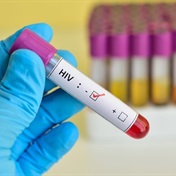- In a case report, doctors describe a patient whose immune system cleared itself of HIV.
- Other cases have been reported after people received stem cell transplants.
- People who can naturally suppress HIV are known as 'elite controllers'.
An Argentinian woman who had HIV has made headlines for being only the second known person whose immune system may have cleared the virus from their body without any drugs or treatment.
In a case report published in Archives of Internal Medicine, doctors wrote that they conducted tests on more than a billion of the woman's cells and found no viable trace of HIV infection.
“These observations raise the possibility that a sterilising cure may be an extremely rare, but possible, outcome of HIV-1 infection,” they wrote.
The anonymous woman, referred to as the "Esperanza patient" (named after her hometown), was diagnosed with HIV-1 in 2013. Eight years later, follow-up checks and several commercial viral load tests confirmed that there was no sign of active HIV infection in her body, nor any evidence of HIV-1-associated disease.
HIV-1 and HIV-2
HIV-1 is the most common type of HIV, notes Avert, and accounts for around 95% of all infections worldwide. HIV-2, on the other hand, is relatively uncommon, and less infectious than HIV-1.
According to the World Health Organization (WHO), globally, 37.7 million people were living with HIV as of 2020. Statistics indicate that 62% of people living with HIV in South Africa were receiving antiretroviral treatment (ART) in 2018.
Similar cases, but with transplants
Over the past couple of years, there have been reports of people with HIV who were able to suppress the virus without ARTs, but with the help of stem cell transplants. They became known as "elite controllers".
Cases dominating the news include the "Berlin patient" and the "London patient" who both overcame HIV with the help of stem cell transplants, originally designed to kill cancer cells.
In the Berlin patient, the transplant unexpectedly "cured" the patient, Timothy Ray Brown, who was diagnosed with HIV in 1995. The transplant put the virus into sustained remission, even without ARTs, to the extent that it could no longer be detected.
Adam Castillejo, the London patient, was diagnosed with HIV in 2003 and no longer required his daily ARTs after receiving donor stem-cell treatment, which he also received for cancer.
The BBC reported that his HIV-infected cells were wiped out and replaced during his cancer therapy. His donor was reported to also be one of the 1% of people born with genes that prevent HIV from entering and infecting cells.
These reports suggested that stem cell transplants may be worth looking into, as they appear to provide an effective (but very rare) form of sterilisation of the virus.
Differences in the new case
The current study reports that the Esperanza patient has had no detectable HIV “for more than eight years in the absence of antiretroviral therapy”. She only took ARTs at one stage during these eight years, when she was pregnant (in 2019 and 2020).
Her case is, however, different to the other elite controllers, the authors pointed out, as she appeared to have achieved "complete clearance of all replication-competent HIV-1 proviruses during natural infection". Simply put, she caught HIV, and her immune system got rid of the virus without the help of ARTs or stem cell transplants.
They added: “What distinguishes her from all other described elite controllers and post-treatment controllers is the absence of detectable intact HIV-1 proviruses and replication-competent HIV-1 viral particles in large numbers of cells.”
The first documented case of this nature was that of Loreen Willenberg, from the US, who appeared to be cured of HIV by her own immune system.
Willenberg has been in remission for decades, without treatment, and has shown no signs of the intact virus in peripheral blood mononuclear cells (PBMCs) analysis. PBMCs are a diverse mixture of specialised immune cells that play an important role in keeping our bodies healthy.
Clarifying their statements
These findings are certainly promising, but the scientists were careful about the claims they made in their paper: "Does this imply that our patient has developed a sterilising cure during natural infection? We believe this is likely, but it cannot be proved … A sterilising cure of HIV-1 can never be empirically proved," they wrote.
Professor John Frater, from the University of Oxford, weighed in on this. He told BBC News that while it was near impossible to determine if someone had been truly cured of HIV, the researchers had done "as much as could be asked of them with current technology" to prove it.
ARTs still play critical role
Lead investigator Dr Xu Yu said: "There may be an actionable path to a sterilising cure for people who are not able to do this on their own. We are now looking toward the possibility of inducing this kind of immunity in persons on ART, through vaccination, with the goal of educating their immune systems to be able to control the virus without ART."
Yu is from the Ragon Institute of Massachusetts General Hospital, Massachusetts Institute of Technology and Harvard.
If more research is conducted on this process, it might offer a promising method for potentially curing HIV patients, experts believe. Still, this should not take away from the highly effective ARTs. While the drugs cannot cure HIV, they keep the virus under control and ensure that people living with it can live long and healthy lives.
*Sign up for our Daily Dose newsletter here.
READ | 1.3m in SA switched to new ARV, but weight gain is a concern
READ | HIV prevention injection hailed as a 'major breakthrough' for women
READ | 7 things you should know about HIV, but probably don’t




 Publications
Publications
 Partners
Partners












